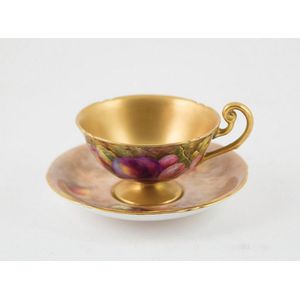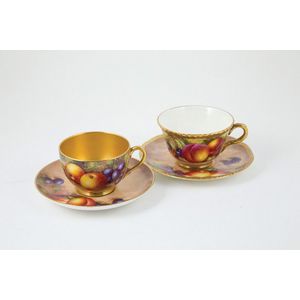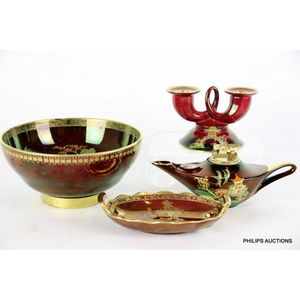Carlton Ware Rouge Royale Chinoiserie Collection
You must be a subscriber, and be logged in to view price and dealer details.
Subscribe Now to view actual auction price for this item
When you subscribe, you have the option of setting the currency in which to display prices to $Au, $US, $NZ or Stg.
- Chinoiserie - Furniture and decorative items decorated in imitation of a Western interpretation of the Chinese style. The Chinoiserie style first became popular in the late 17th century, though there were frequent revivals, notably by Chippendale (hence 'Chinese Chippendale') during the Regency period, and the Anglo-Japanese style in the second half of the 19th century.
The ubiquitous 'willow pattern' is the most common 'Chinese' theme used in porcelain, while on furniture the Chinoiserie style usually has black or red painted and lacquered decoration, though the hallmark of the furniture style is the use of fretwork in geometrical patterns, pagodas and other decorative forms.
Japonaiseries, as the name implies, are motifs in imitation of the Japanese taste.
See also "Chinese Chippendale". - Attributed - A cataloguing term where the item in the opinion of the cataloguers, is a of the period of the artist, craftsman or designer, and which probably in whole or part is the work of that person.
- Art Deco Period - The Art Deco period was a cultural movement that emerged in the 1920s and 1930s, and was characterized by its emphasis on modernism, luxury, and elegance. The name "Art Deco" comes from the Exposition Internationale des Arts Décoratifs et Industriels Modernes, a large exhibition held in Paris in 1925 that showcased the latest trends in decorative arts.
Art Deco was a reaction against the ornate and elaborate styles of the previous era, and reflected a new modern sensibility. It was characterized by streamlined, geometric shapes, bright colours, and the use of new materials such as chrome, glass, and Bakelite. Art Deco designers sought to create a sense of luxury and sophistication, often incorporating expensive materials such as ivory, marble, and rare woods.
Art Deco had a significant impact on a wide range of artistic fields, including architecture, fashion, graphic design, and interior design. Some of the most iconic examples of Art Deco architecture include the Empire State Building in New York City, the Hoover Building in London, and the Palais de Chaillot in Paris.
The Art Deco period came to an end in the 1940s, as World War II and changing cultural trends led to a shift in artistic styles. However, Art Deco remains an important influence on design and art, and continues to be celebrated for its modernist sensibility and glamorous aesthetic. - Circa - A Latin term meaning 'about', often used in the antique trade to give an approximate date for the piece, usually considered to be five years on either side of the circa year. Thus, circa 1900 means the piece was made about 1900, probably between 1895 and 1905. The expression is sometimes abbreviated to c.1900.
This item has been included into following indexes:
Visually similar items

Royal Worcester teacup and saucer painted with peaches, cherries, pears and blackberries, signed Freeman

Royal Worcester tea cup & saucer continuously painted with plums, strawberries & gooseberries, signed H Aryton

Royal Worcester teacup and saucer painted with apples, grape and peaches, signed Freeman

A collection of four Chinese Thai market objects, late Qing dynasty, comprising a footed bowl, 10 cm, a copper-mounted shallow bowl, 12.8 cm diameter and teabowl, 6.4 cm and a spoon, 13 cm long. Provenance: J L Karas Collection, Sydney
